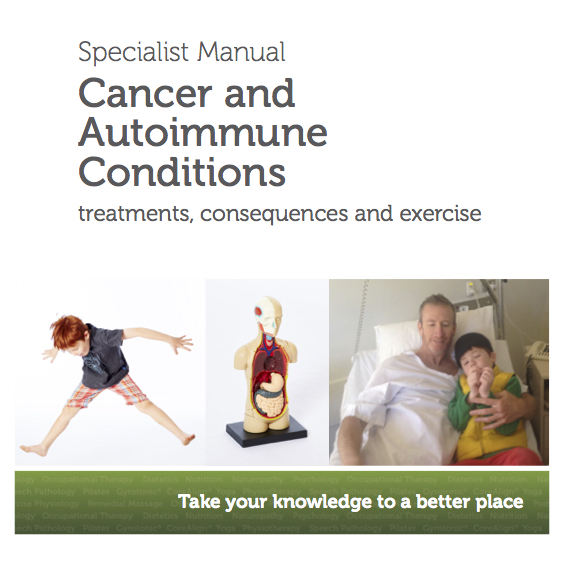Cancer and exercise – reduces the risk of death by nearly half
Wed,Aug 23, 2017 at 01:39PM by Michael Schwarer
This is from part of our course that we are offering in SantaBaraba (April 2018) and New Jersey (May 2018). If you are interested in participating in this 15 hour course, manual included, please feel free to contact us education@bodyorganics.com.au
The following article about cancer and exercise, Cancer survival: exercise reduces risk of death by nearly half, recently appeared in The Australian online newspaper and is worth repeating. At Body Organics we fully support the notion that exercise and movement can not only improve quality of life but also can reduce the risk of chronic diseases such as cardiovascular disease (heart attacks, stroke) obesity and cancer.
A review of studies on cancer and exercise shows reduced mortality rates
The impact exercise has on surviving many common cancers can’t be ignored, with Australian research showing the risk of dying may be reduced by nearly a half by regularly walking and lifting moderate weights. A review of more than 100 studies involving tens of thousands of cancer patients worldwide published in the American Journal of Epidemiology found mortality rates among those who regularly exercised fell 28-44 per cent. The risk of cancer re-occurring dropped up to 35 per cent and side-effects from chemotherapy were also less pronounced among patients predominantly suffering from breast, bowel and prostate cancer.
Cancer and exercise – call for more funding to ensure access to exercise
In light of the findings, lead author Associate Professor Prue Cormie at the Australian Catholic University’s Institute for Health and Ageing, is calling for more funding to ensure all cancer patients have access to exercise treatment facilities in hospitals and the community.
“Exercise does significantly protect against dying from cancer, against cancer coming back and it reduces the severity of treatment-related side effects in people with cancer,” she said.
“By having qualified exercise specialists and dedicated exercise programs available for cancer patients in the community and hospital, we can reduce the impact a diagnosis has on the health and wellbeing of those affected by cancer, improve outcomes for patients and potentially reduce health system expenditure,” said ProfCormie.
Cancer effects one in two Australians by the age of 85 and takes the lives of nearly 50,000 people in Australia every year.
Kathy Chapman, Chair of Cancer Council Australia’s Nutrition and Physical Activity Committee says this research adds to growing evidence that exercise is a vital part of cancer treatment.
“It’s really been an emerging area over the last five to 10 years about the importance of exercise in terms of improving overall survival but it also particularly helps with the quality of life that cancer patients and survivors can have,” Ms Chapman said. She says exercise is particularly beneficial for fatigue — a common problem experienced by cancer sufferers.
“So we’ve really seen the benefits in terms of how it can affect quality of life but these longer term studies are now looking at how it’s great for outcomes in terms of lowering the death rate,” she said.
While more research into cancer and exercise is needed to understand the mechanisms behind the effect of exercise has on protecting against cancer, Ms Chapman says it should be seen as “really important”.
The Cancer Council runs a free program called Healthy Living After Cancer where people who have the disease can access up to 12 over-the-phone coaching consultations with trained health professionals.
Professor Cormie recommends that to achieve significant benefits cancer patients should work towards 150 minutes moderate intensity aerobic exercise — for example a 30-minute brisk walk, 5 days per week — and two to three moderate intensity resistance training efforts (lifting weights) each week.
Workshop on Cancer, Exercise and Autoimmune conditions
Body Organics periodically runs a workshop for pilates teachers and movement professionals that covers topics such as exercise and its relationship to cancer, lymphoedema and other autoimmune conditions. The purpose of this workshop is to gain an understanding of the impact of cancers, their different treatments and the effects on the body both throughout the treatment and afterwards. The impact of medication on exercise and exercise prescription are also discussed. Some common movements and repertoire are explored as part of the workshop component. For more information check our course schedule for upcoming workshops around Australia, USA and Europe..
 0
0 
